Love Lessons
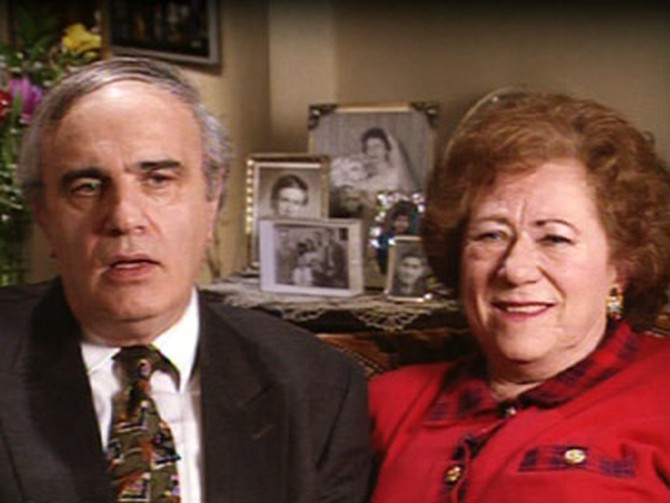
When Oprah chose Love in the Time of Cholera by Nobel Prize-winning author Gabriel García Márquez for her Book Club, she chose one of the greatest love stories ever written. This exploration of a 50-year affair explores the nature of love in all its forms—passion, lust, infidelity and romance.
Now get ready to read about four more amazing love stories. The first, Oprah says, "is the single greatest love story, in 22 years of doing this show, we've ever told on the air."
When he was 12, Herman Rosenblat and his family were taken from their home in Poland and sent to a concentration camp in Nazi Germany. Young Herman was forced to work shoveling bodies into a crematorium. All the while he did not know if he, too, would soon be killed.
One day two years later, Herman walked up to the barbed wire fence and saw a girl on the other side. "She says, 'What are you doing in there?'" Herman says. "I said to her, 'Can you give me something to eat?' And she took an apple out of her jacket."
The girl fed Herman an apple every day for seven months. Then one day he told her not to come back—he was being moved to another camp. "A tear came down her eyes," Herman says. "And as I turned around and went back I started to cry, too. I started to cry knowing that I might not see her again."
Herman was shipped to Czechoslovakia. Just two hours before he was scheduled to die in the gas chambers there, Russian troops liberated the camp and Herman was set free.
UPDATE: On December 27, 2008, Herman Rosenblat admitted to fictionalizing portions of his life story, including how he met his wife. Based on this admission, the publisher of his forthcoming memoir—Angel at the Fence —cancelled plans to print his book.
Now get ready to read about four more amazing love stories. The first, Oprah says, "is the single greatest love story, in 22 years of doing this show, we've ever told on the air."
When he was 12, Herman Rosenblat and his family were taken from their home in Poland and sent to a concentration camp in Nazi Germany. Young Herman was forced to work shoveling bodies into a crematorium. All the while he did not know if he, too, would soon be killed.
One day two years later, Herman walked up to the barbed wire fence and saw a girl on the other side. "She says, 'What are you doing in there?'" Herman says. "I said to her, 'Can you give me something to eat?' And she took an apple out of her jacket."
The girl fed Herman an apple every day for seven months. Then one day he told her not to come back—he was being moved to another camp. "A tear came down her eyes," Herman says. "And as I turned around and went back I started to cry, too. I started to cry knowing that I might not see her again."
Herman was shipped to Czechoslovakia. Just two hours before he was scheduled to die in the gas chambers there, Russian troops liberated the camp and Herman was set free.
UPDATE: On December 27, 2008, Herman Rosenblat admitted to fictionalizing portions of his life story, including how he met his wife. Based on this admission, the publisher of his forthcoming memoir—Angel at the Fence —cancelled plans to print his book.
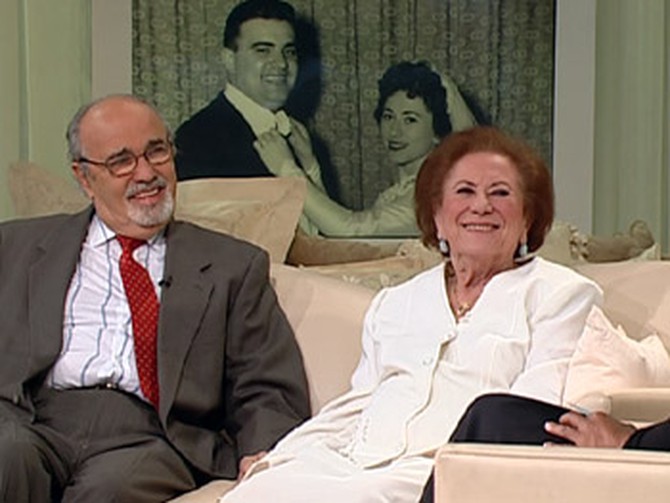
Almost 15 years later, Herman was living and working in New York City. A friend set him up on a blind date with a woman named Roma Radzika. Herman says he was immediately drawn to her. When they began talking about their lives, Roma asked Herman where he was during World War II. "I said, 'In a concentration camp,'" he says. "And then she says, 'I came to a camp and I met a boy there and I gave him some apples and I sent them over the fence.'
"And suddenly it hit me like a ton of bricks. And I said to her, 'There was a boy? Was he tall?' And she said, 'Yes.' I said, 'And one day he told you not to come around anymore because he's leaving?' And she says, 'Yes.' I said, 'That boy was me.'
Roma and her family had moved from Poland to Germany, using forged papers to hide that they were Jewish. They lived on a farm next to Herman's camp, posing as Christians to avoid being captured. Roma says when she brought apples and bread for Herman, he used to say, "I'll see you tomorrow."
"Well, what can I tell you? I proposed right then and there," Herman says. "I said, 'Look, I'll never let you go anymore. … Now that we're free we're going to be together forever.'"
"And suddenly it hit me like a ton of bricks. And I said to her, 'There was a boy? Was he tall?' And she said, 'Yes.' I said, 'And one day he told you not to come around anymore because he's leaving?' And she says, 'Yes.' I said, 'That boy was me.'
Roma and her family had moved from Poland to Germany, using forged papers to hide that they were Jewish. They lived on a farm next to Herman's camp, posing as Christians to avoid being captured. Roma says when she brought apples and bread for Herman, he used to say, "I'll see you tomorrow."
"Well, what can I tell you? I proposed right then and there," Herman says. "I said, 'Look, I'll never let you go anymore. … Now that we're free we're going to be together forever.'"
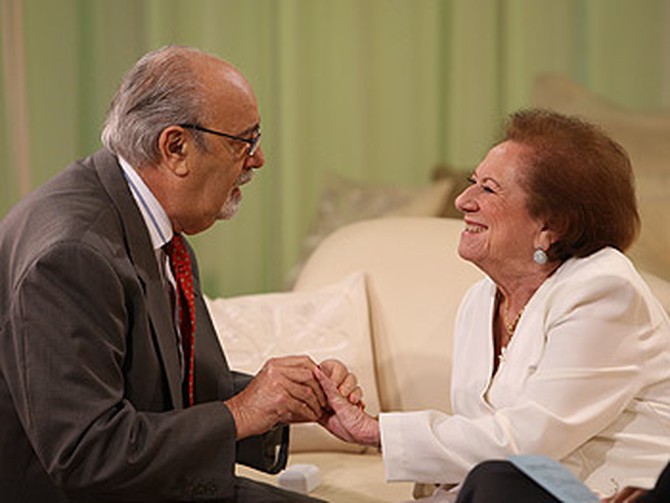
In 1996, on The Oprah Show stage, Herman and Roma gave Oprah a moment she'll never forget. Herman stood and addressed his wife: "Darling, you've fed me when I was hungry. You fed me when we were married. You fed me…until now. But now I'm not hungry anymore, and I'm hungry for your love!"
Since that day their love has continued to grow. Herman and Roma have now been married for nearly 50 years. He says he's learned a valuable lesson from love. "Every morning when I get up I say, 'I love you. I love you. I love you,'" Herman says. "And not only [do you say], 'I love you,' but you mean it."
Eleven years after their first Oprah Show appearance, Herman decides to honor his wife again—this time by getting down on bended knee. "Sweetheart, it was 64 years ago when I first saw you," he says to Roma. "My mother came to me and said to me, 'I'm sending you an angel.' And a couple of days later you appeared at the other side of the fence while I was in a concentration camp. Then in 1957, 14 years later, I had a blind date, and it was you. Now our 50th anniversary is coming up. With this ring, my dear, I pronounce my love for you forever. And as this ring has got no end, my love for you doesn't have any end."
"You have become the beautiful metaphor for what love can be," Oprah says. "For endurance, and fate and destiny."
Since that day their love has continued to grow. Herman and Roma have now been married for nearly 50 years. He says he's learned a valuable lesson from love. "Every morning when I get up I say, 'I love you. I love you. I love you,'" Herman says. "And not only [do you say], 'I love you,' but you mean it."
Eleven years after their first Oprah Show appearance, Herman decides to honor his wife again—this time by getting down on bended knee. "Sweetheart, it was 64 years ago when I first saw you," he says to Roma. "My mother came to me and said to me, 'I'm sending you an angel.' And a couple of days later you appeared at the other side of the fence while I was in a concentration camp. Then in 1957, 14 years later, I had a blind date, and it was you. Now our 50th anniversary is coming up. With this ring, my dear, I pronounce my love for you forever. And as this ring has got no end, my love for you doesn't have any end."
"You have become the beautiful metaphor for what love can be," Oprah says. "For endurance, and fate and destiny."
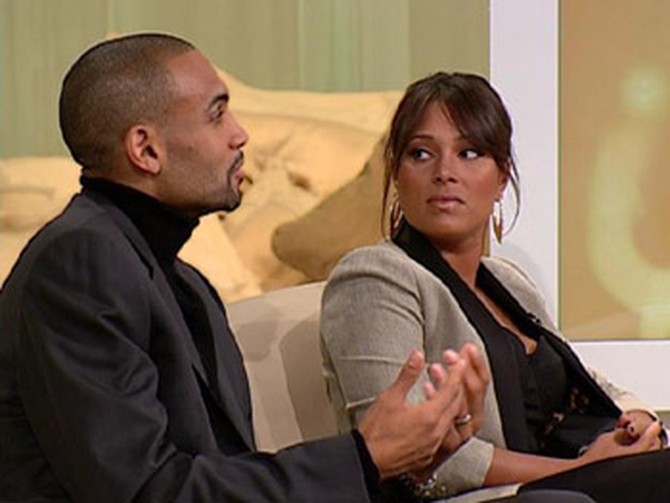
When NBA all-star Grant Hill married Tamia, a Grammy-nominated R&B singer, in 1999, the couple looked forward to years of health and happiness. Little did they know, their promise to stand together in sickness and in health would be put to the test shortly after saying "I do."
After years of jumping, pivoting and posting on courts across the country, Grant suffered an ankle injury that almost cost him his career…and his life. He had three ankle surgeries in just three years. Then in 2003, Grant went in for his fourth ankle operation.
"[Grant] came home, and he had a fever for a couple of days," Tamia says. "I ended up calling the doctor, and they said, 'Bring him in.' By the time he got there, he was shivering and shaking. I didn't quite realize how serious it was until I got there myself…it was scary."
Doctors discovered that Grant had developed a staph infection, which nearly killed him. "It was a very scary time, and I think that made me really put things into perspective," Tamia says. "It was no longer about whether he could be the greatest basketball player. I wanted him to be around to be a husband and a father to my children."
Grant says he doesn't know if he could've overcome his injuries without his family. "I was as close as I've ever been to checking out," he says. "My wife really got me through it."
Just when the Hills thought the tough times were behind them, Tamia received a frightening diagnosis of her own.
After years of jumping, pivoting and posting on courts across the country, Grant suffered an ankle injury that almost cost him his career…and his life. He had three ankle surgeries in just three years. Then in 2003, Grant went in for his fourth ankle operation.
"[Grant] came home, and he had a fever for a couple of days," Tamia says. "I ended up calling the doctor, and they said, 'Bring him in.' By the time he got there, he was shivering and shaking. I didn't quite realize how serious it was until I got there myself…it was scary."
Doctors discovered that Grant had developed a staph infection, which nearly killed him. "It was a very scary time, and I think that made me really put things into perspective," Tamia says. "It was no longer about whether he could be the greatest basketball player. I wanted him to be around to be a husband and a father to my children."
Grant says he doesn't know if he could've overcome his injuries without his family. "I was as close as I've ever been to checking out," he says. "My wife really got me through it."
Just when the Hills thought the tough times were behind them, Tamia received a frightening diagnosis of her own.

After just four years of marriage, Tamia learned she had multiple sclerosis (MS), a chronic disease of the central nervous system that can affect the brain and spinal cord. "I was a little shocked for a minute, and [then] I started to cry," she says.
Tamia says she found comfort in knowing that Grant was by her side during this difficult time. "When I was diagnosed, the first thing he said was, 'What do we need to do to fight this?'" she says. "It's good to have a fighter on your side."
Though there's no cure for MS, Tamia has learned to live with the disease. "She's dealt with it remarkably. Seeing her strength and her attitude has really helped me," Grant says. "I admire that. There are so many qualities to love about my wife, but I think her strength is the main thing."
Grant and Tamia have learned to lean on each other when times are tough and celebrate the little things in life, including their two little girls, Myla and Lael.
"I think it's the everyday things we love about each other," Tamia says. "It's watching [Grant] take Myla to school or [him asking], 'You want me to hold the baby so you can have the extra half an hour.'"
Tamia says she found comfort in knowing that Grant was by her side during this difficult time. "When I was diagnosed, the first thing he said was, 'What do we need to do to fight this?'" she says. "It's good to have a fighter on your side."
Though there's no cure for MS, Tamia has learned to live with the disease. "She's dealt with it remarkably. Seeing her strength and her attitude has really helped me," Grant says. "I admire that. There are so many qualities to love about my wife, but I think her strength is the main thing."
Grant and Tamia have learned to lean on each other when times are tough and celebrate the little things in life, including their two little girls, Myla and Lael.
"I think it's the everyday things we love about each other," Tamia says. "It's watching [Grant] take Myla to school or [him asking], 'You want me to hold the baby so you can have the extra half an hour.'"

Grant hasn't had to look far for marital role models. His parents, Calvin and Janet, have been married for 37 years.
"[They're a] very good model," he says. "My dad was a professional athlete. My mom has her own consulting firm. For me, it was a great example growing up and having them as parents, seeing how they work through their marriage. Because marriage, as we all know, takes hard work."
As a child, Grant says he took note of every interaction between his mother and father. "I saw the good, the bad and everything in between," he says. "I know that for my daughters, especially as women, how I interact with my wife, how they see me treat her, is a lot of times what they're going to find and be attracted to in a man. … Little ones pick up on everything."
"[They're a] very good model," he says. "My dad was a professional athlete. My mom has her own consulting firm. For me, it was a great example growing up and having them as parents, seeing how they work through their marriage. Because marriage, as we all know, takes hard work."
As a child, Grant says he took note of every interaction between his mother and father. "I saw the good, the bad and everything in between," he says. "I know that for my daughters, especially as women, how I interact with my wife, how they see me treat her, is a lot of times what they're going to find and be attracted to in a man. … Little ones pick up on everything."
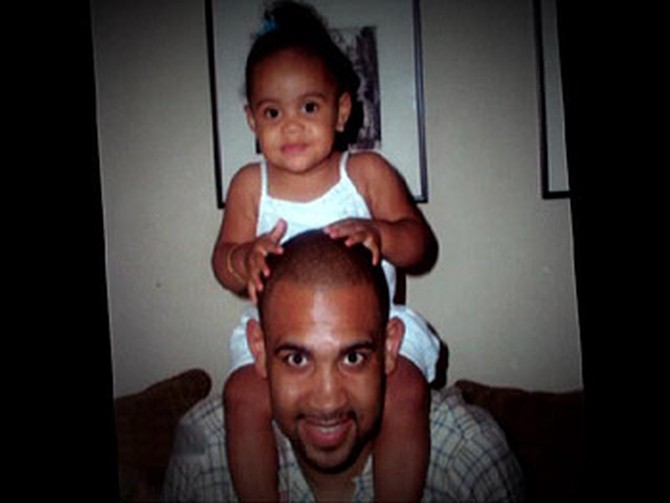
Over the years, Grant and Tamia say the tough times have made their love stronger. And, they have two reasons to keep fighting—their daughters, 5-year-old Myla and 3-month-old Lael.
When he's not traveling with the Phoenix Suns, Grant spends time at home, doting on these two little ladies. "The role of being a father is just super important, especially with little girls," he says. "First and foremost is to treat their mother with the utmost respect and love."
Grant hopes his commitment sets a good precedent in his daughters' lives. "[I'm] raising the bar so high that if any guy comes around she can say, 'Oh I'm not impressed. You bought me a flower for Valentine's Day. My dad has been buying me two dozen flowers every Valentine's Day and chocolate,'" he says. "That's important because, a lot of times, the first man that a girl or woman falls in love with is her father."
Even when Grant gets home late from a basketball game, he says he always gets up and takes Myla to school. "That's our time," he says. "No matter what time I get in or how tired I am, I want to be with her in the morning. … That's daughter and father time."
Although Tamia loves seeing Grant with their daughters, she says it can be bittersweet at times. "I didn't grow up with my biological father in the house," she says. "I'm proud, on one hand, that I can give that to [my children], but it breaks my heart sometimes to see the interaction and see what I've missed out on."
At the end of the day, Grant says his children are the legacy he'll be most proud of. "No matter what your achievements are in life, it's about raising your children to become good, successful, respectable human beings," he says.
When he's not traveling with the Phoenix Suns, Grant spends time at home, doting on these two little ladies. "The role of being a father is just super important, especially with little girls," he says. "First and foremost is to treat their mother with the utmost respect and love."
Grant hopes his commitment sets a good precedent in his daughters' lives. "[I'm] raising the bar so high that if any guy comes around she can say, 'Oh I'm not impressed. You bought me a flower for Valentine's Day. My dad has been buying me two dozen flowers every Valentine's Day and chocolate,'" he says. "That's important because, a lot of times, the first man that a girl or woman falls in love with is her father."
Even when Grant gets home late from a basketball game, he says he always gets up and takes Myla to school. "That's our time," he says. "No matter what time I get in or how tired I am, I want to be with her in the morning. … That's daughter and father time."
Although Tamia loves seeing Grant with their daughters, she says it can be bittersweet at times. "I didn't grow up with my biological father in the house," she says. "I'm proud, on one hand, that I can give that to [my children], but it breaks my heart sometimes to see the interaction and see what I've missed out on."
At the end of the day, Grant says his children are the legacy he'll be most proud of. "No matter what your achievements are in life, it's about raising your children to become good, successful, respectable human beings," he says.

For the past 27 years of their nearly 40-year marriage, Patricia and Alton have written each other love letters every day. That adds up to over 20,000 love letters—more than 105 pounds of love!
The idea to write letters every day originated with Alton after they attended a Marriage Encounter® weekend—a program that teaches couples how to make good marriages better by improving communication. "We had written love letters spasmodically for several months," Alton says. "But I could tell from the love letters that it wasn't getting everything across I had seen in the couple that had taught us."
Their communication broke down after they lost a child and Patricia says she even considered leaving Alton. "When we talked, I cried … and he didn't like to see me cry. And so, he didn't want to talk about it. And I took his not talking about it as he didn't care," Patricia says. "It was about that time we started writing our letters, and it pulled us back together."
The idea to write letters every day originated with Alton after they attended a Marriage Encounter® weekend—a program that teaches couples how to make good marriages better by improving communication. "We had written love letters spasmodically for several months," Alton says. "But I could tell from the love letters that it wasn't getting everything across I had seen in the couple that had taught us."
Their communication broke down after they lost a child and Patricia says she even considered leaving Alton. "When we talked, I cried … and he didn't like to see me cry. And so, he didn't want to talk about it. And I took his not talking about it as he didn't care," Patricia says. "It was about that time we started writing our letters, and it pulled us back together."
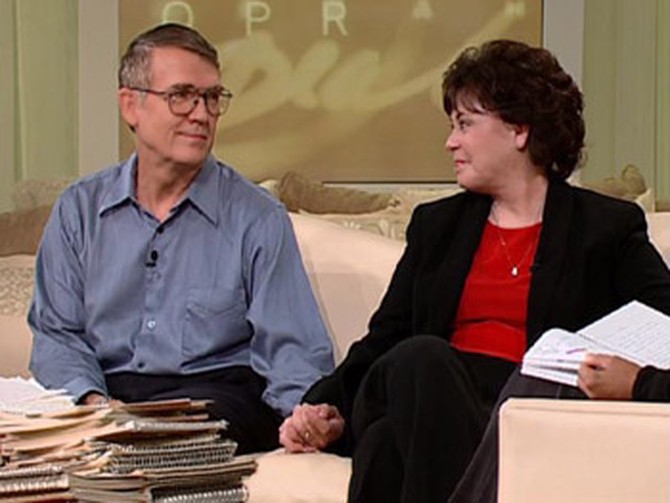
The letters consist of three parts, which Alton and Patricia say they usually write before bed.
"I feel honored you think I'm a great parent," Alton wrote.
"I love you for fixin' my supper plate tonight," Alton wrote. "It was good."
Find out how to start journaling with your spouse.
While Patricia and Alton write love letters every day, it doesn't mean they're never upset with each other. Alton says there have been days when their only communication is the love letter.
At those times, Patricia says, "I usually write, 'I love you today.' Period. No reason. That's because I'm making the decision to love him that day. … Sometimes we get angry. We don't like each other at the moment, but we still love each other."
Part 1: How I feel today.
"Dear Alton," Patricia wrote after a fight. "I still feel separated from you because of last night.""I feel honored you think I'm a great parent," Alton wrote.
Part 2: "I love you because…"
"I love you for giving the children their baths," Patricia wrote."I love you for fixin' my supper plate tonight," Alton wrote. "It was good."
Part 3: A question of the day.
Alton says these questions could be, "How do I feel when you're sick? How do I feel when you're short with the children? How do I feel when you do something special for me?"Find out how to start journaling with your spouse.
While Patricia and Alton write love letters every day, it doesn't mean they're never upset with each other. Alton says there have been days when their only communication is the love letter.
At those times, Patricia says, "I usually write, 'I love you today.' Period. No reason. That's because I'm making the decision to love him that day. … Sometimes we get angry. We don't like each other at the moment, but we still love each other."
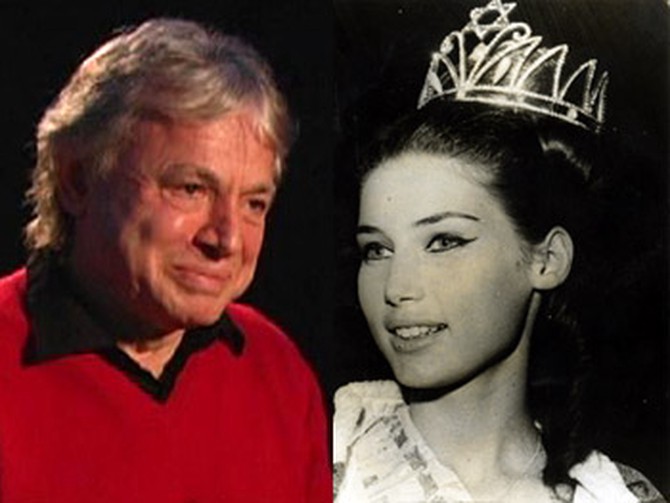
Some say a picture is worth a thousand words, but for one man, a picture he saw 43 years ago proved to be priceless.
When Moti was a 17-year-old living in Israel, he came across a photo of a beauty queen named Ronit. The photo captured his heart. "She was in a picture a short time after her crowning as Miss Israel of 1964," he says. "There was something about those eyes that just blew me away. I felt a connection with her."
Though he always kept Ronit in the back of his mind, Moti moved on with his life and became a psychologist. "I was married for a period of time," he says. "I have two beautiful children, but I somehow never forgot Ronit. I'm not a stalker. I'm not a crazy guy, but she was somewhere deep in my heart and that's what I felt."
After four decades of wondering about the girl of his dreams, Moti decided to take a chance on love.
When Moti was a 17-year-old living in Israel, he came across a photo of a beauty queen named Ronit. The photo captured his heart. "She was in a picture a short time after her crowning as Miss Israel of 1964," he says. "There was something about those eyes that just blew me away. I felt a connection with her."
Though he always kept Ronit in the back of his mind, Moti moved on with his life and became a psychologist. "I was married for a period of time," he says. "I have two beautiful children, but I somehow never forgot Ronit. I'm not a stalker. I'm not a crazy guy, but she was somewhere deep in my heart and that's what I felt."
After four decades of wondering about the girl of his dreams, Moti decided to take a chance on love.
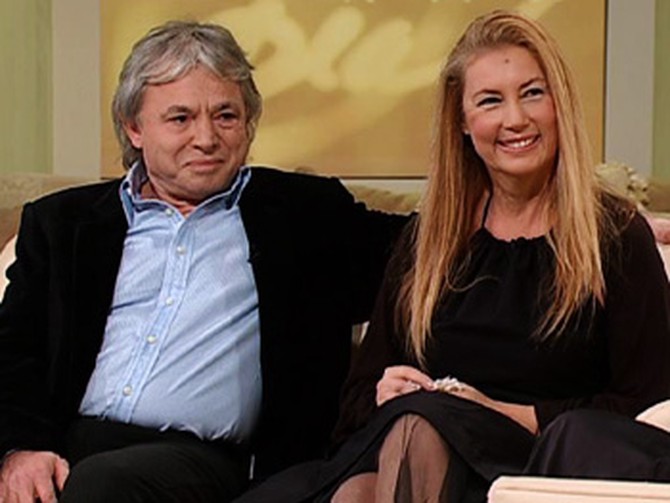
In 2004, Moti got Ronit's phone number and placed a call that changed their lives forever. "I heard about this guy that was interested in calling me who has been in love with me for many, many years," Ronit says. "Since I'm a romantic, I decided I would give it a chance to see what comes up."
What do you say to someone who you've loved for years but never met? "I called her, [and] I said, 'You've been in my heart 40 years. I believe we are soul mates, and I believe we might be husband and wife someday,'" Moti says.
The first time Moti called, Ronit says they talked for a long time. "He sounded very positive and [he had] wonderful energy," she says. "I told him on the phone, 'Moti, I am almost 60 years old. I'm a grandmother of eight. Don't expect this 18-year-old to come down the runway.' Moti said, 'I know you. I know you from the age of 18. I know these eyes and I know you. I am waiting for you.'"
A year and a half after their first meeting, Moti and Ronit were married. "For sure we are soul mates," Ronit says. "We are like two 16-year-olds starting all over again. Moti loves everything about me, and he makes me feel like a real beauty queen inside out and outside in."
Though he didn't know things would turn out this way, Moti says he had to follow his heart. "I had a vision of having her eventually and really connecting with her in a soulful love, but nobody's really sure about this," he says. "You have a dream, and you try. You go for it."
What do you say to someone who you've loved for years but never met? "I called her, [and] I said, 'You've been in my heart 40 years. I believe we are soul mates, and I believe we might be husband and wife someday,'" Moti says.
The first time Moti called, Ronit says they talked for a long time. "He sounded very positive and [he had] wonderful energy," she says. "I told him on the phone, 'Moti, I am almost 60 years old. I'm a grandmother of eight. Don't expect this 18-year-old to come down the runway.' Moti said, 'I know you. I know you from the age of 18. I know these eyes and I know you. I am waiting for you.'"
A year and a half after their first meeting, Moti and Ronit were married. "For sure we are soul mates," Ronit says. "We are like two 16-year-olds starting all over again. Moti loves everything about me, and he makes me feel like a real beauty queen inside out and outside in."
Though he didn't know things would turn out this way, Moti says he had to follow his heart. "I had a vision of having her eventually and really connecting with her in a soulful love, but nobody's really sure about this," he says. "You have a dream, and you try. You go for it."
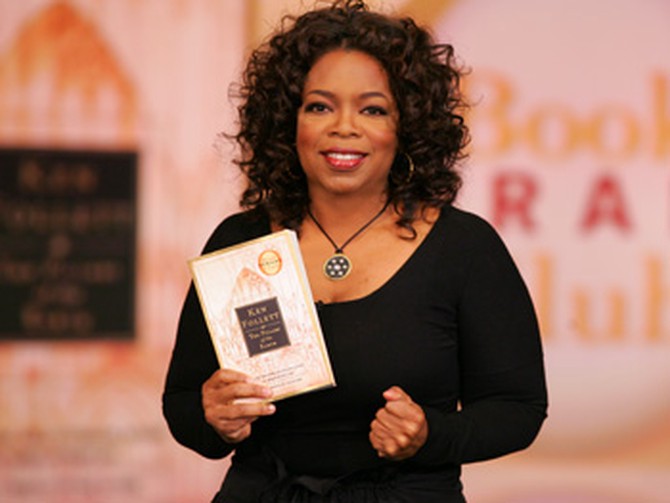
After reading the amazing love story, Love in the Time of Cholera , Oprah is ready to make a brand new Book Club selection!
Watch Oprah's Love in the Time of Cholera discussion!
The Pillars of the Earth by Ken Follett is set in England during the Middle Ages. This epic tale is about the struggle between good and evil during the quest to build the greatest Gothic cathedral the world has ever known.
"It's such a great read," Oprah says. "It's like nothing I would ever read or had ever read before. … I got to 800 pages and I slowed myself down because I didn't want it to end."
Watch Oprah's Love in the Time of Cholera discussion!
The Pillars of the Earth by Ken Follett is set in England during the Middle Ages. This epic tale is about the struggle between good and evil during the quest to build the greatest Gothic cathedral the world has ever known.
"It's such a great read," Oprah says. "It's like nothing I would ever read or had ever read before. … I got to 800 pages and I slowed myself down because I didn't want it to end."
Published 01/01/2006

